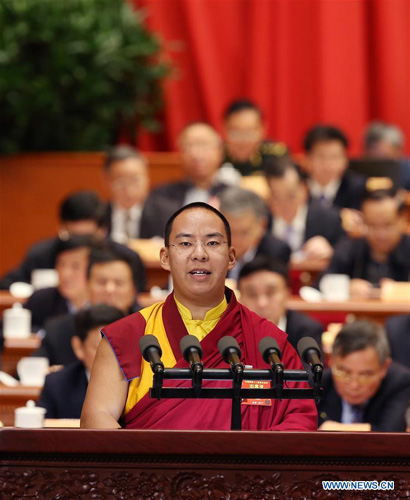Political advisors pool wisdom for public concerns
Xinhua, March 12, 2017 Adjust font size:
Chinese political advisors gathered Saturday to pool wisdom for religious belief, cross-Straits relations, food safety, financial governance, judicial reform and united front work, among other topics.
Fourteen members of the Chinese People's Political Consultative Conference (CPPCC) National Committee addressed a plenary meeting at the Great Hall of the People.
Yu Zhengsheng, a member of the Standing Committee of the Political Bureau of the Communist Party of China Central Committee and chairman of the CPPCC National Committee, attended the plenary meeting.
During the meeting, the 11th Panchen Lama Bainqen Erdini Qoigyijabu lamented that some Buddhist temples and monks are eroded by commercialization and called on followers to behave correctly.
The Panchen Lama said that with commercialization, some monks went after money and power instead of guarding Buddhist ethics or concentrating on Buddhist pursuits. The 27-year-old senior monk, also vice president of the Buddhist Association of China, said though such incidents and people were not the mainstream, they had left an "extremely bad" influence.
The Panchen Lama said he was concerned about insufficient efforts in nurturing talent as some temples had monks but no instructors, Buddhist scripts but no teaching. Preaching is impossible without a good team of Buddhist instructors.
To keep pace with the needs of the time, Buddhist doctrines should be interpreted in ways compatible to the country's reality and social progress, so that the religion can play its positive role to advance social and economic developments, he said.
The Panchen Lama said he felt "a mission of our time" -- that is to be patriotic, to love religion, and contribute efforts to the Chinese nation's rejuvenation and the well-being of humankind.
